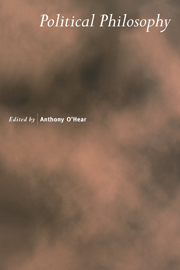Book contents
- Frontmatter
- Contents
- Preface
- Notes on Contributors
- Making the World Safe for Utilitarianism
- Innocent Before God: Politics, Morality and the Case of Billy Budd
- Democracy and Openness
- Rights and Human Rights
- Prerogative to Depart from Equality
- Casting the First Stone: Who Can, and Who Can't, Condemn the Terrorists?
- Against Egalitarianism
- Big Decision: Opting, Converting, Drifing
- The Epistemology of Unjust War
- High Culture, Low Politics
- Edmund Burke and the Anglo-American Tradition of Liberty
- The Politics of Emotion: Liberalism and Cognitivism
- Index of Names
Edmund Burke and the Anglo-American Tradition of Liberty
Published online by Cambridge University Press: 04 August 2010
- Frontmatter
- Contents
- Preface
- Notes on Contributors
- Making the World Safe for Utilitarianism
- Innocent Before God: Politics, Morality and the Case of Billy Budd
- Democracy and Openness
- Rights and Human Rights
- Prerogative to Depart from Equality
- Casting the First Stone: Who Can, and Who Can't, Condemn the Terrorists?
- Against Egalitarianism
- Big Decision: Opting, Converting, Drifing
- The Epistemology of Unjust War
- High Culture, Low Politics
- Edmund Burke and the Anglo-American Tradition of Liberty
- The Politics of Emotion: Liberalism and Cognitivism
- Index of Names
Summary
It is proper for more reasons than the most obvious one that I should open this talk by quoting a former President of the Royal Institute of Philosophy, Lord Quinton, whose works on political philosophy I have so much enjoyed—and learnt from.
In a chapter on political philosophy, which he contributed to the Oxford History of Western Philosophy, Lord Quinton says that ‘the effect of the importation of Locke's doctrines in to France was much like that of alcohol in an empty stomach’. In Britain, Lord Quinton adds, Locke's principles ‘served to endorse a largely conservative revolution against absolutist innovation’, whereas in France the importation of Locke's ideas would lead to the radicalism of the French revolution. Why was this so?
I think this is a tremendously important question which has captured the imagination of several generations of Anglophiles in Europe. In this talk today I do not pretend to have an answer to this extremely important and intricate question—and one may wonder whether there is a single answer to this question. All I would like to do is to suggest a possible ingredient for a possible answer to the question. And I would like to suggest, furthermore, that perhaps the ingredient I am going to suggest and certainly the question posed by Lord Quinton are still relevant today.
- Type
- Chapter
- Information
- Political Philosophy , pp. 213 - 230Publisher: Cambridge University PressPrint publication year: 2007

